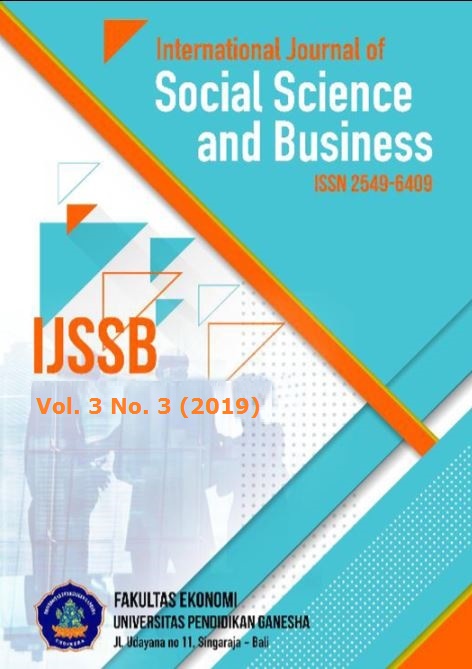The Influence of Exchange Rate, World Oil Price, and BI Rate on Airline Companie’s Return in Indonesian Stock Market
DOI:
https://doi.org/10.23887/ijssb.v3i3.21059Keywords:
Airline Sector, Exchange Rate, World Oil Price, BI Rate, GARCHAbstract
In an effort to support the economic growth of Indonesia, an infrastructure development is carried out to achieve the national development. It brings positive influences on transportation companies in Indonesia. Many companies list their shares to Indonesia Stock Exchange, including PT. Garuda Indonesia (Persero) Tbk (IDX code: GIAA) and PT. AirAsia Indonesia Tbk (IDX code: CMPP), aiming to have additional capital sources. The two companies can be such a reference for investors to make investments, but they still need to consider the macro factors attached. This study examines the influende of exchange rate, world oil price, and Bank Indonesia (BI) rates on the GIAA and CMPP stock returns. The analysis technique used was Generalize Autoregressive Conditional Heteroscedasticity (GARCH) and daily data starting from their IPO to February 28th, 2019. The results showed that the exchange rate negatively affected the GIAA and CMPP stock returns, while the world oil prices only negatively affected the CMPP stock return, and the BI rates only negatively affected the GIAA stock return. In general, the investors are suggested not to buy the GIAA and CMPP shares when the IDR exchange rate weakens against the US dollar exchange rate.References
Aloui, R. J. (2010). Wavelet decomposition and regime shifts: Assessing the effects of crude oil shocks on stock market returns. Energy Policy, Volume 38, Issue 3, 1415-1435.
Ardana, Y. (2016). PengaruhVariabelMakroekonomiterhadapIndeksSahamSyariah di Indonesia: Model ECM. Esensi, 6(1), 17–30. https://doi.org/10.15408/ess.v6i1.3118
Astuti, R., Susanta, H., &Apriatni. (2013). AnalisisPengaruh Tingkat SukuBunga( SBI ), NilaiTukar ( Kurs ) Rupiah , Inflasi , Dan Indeks Bursa InternasionalTerhadapIhsg. Diponegoro Journal of Social and Politic of Science, 2(4), 1–10.
Budiantara, M. (2012). Pengaruh Tingkat SukuBunga, NilaiKurs, danInflasiterhadapIndeksHargaSahamGabungan di Bursa Efek Indonesia PeriodeTahun 2005-2010. JurnalSosiohumaniora, 3(3), 57–66.
Budiman, R. (2017). Investing is Easy. Jakarta: PT. Elex Media Komputindo.
Bollerslev. (1986). Generalized Autoregressive Conditional Heteroscedasticity. Journal of Econometrics 31 Vol, 307-327.
Faf, M. N. (2008). Does oil move equity prices? A global view. Energy Economics, Vol 30, Issue 3, 986-997.
George Filis, S. s. (2011). Dynamic correlation between stock market and oil prices: The case of oil-importing and oil-exporting countries. International Review of Financial Analysis, Volume 20, Issue 3, 152-164.
Gumilang, R. C., Hidayat, R. R., & NP, M. G. W. E. (2014). PengaruhVariabelMakroEkonomi, HargaEmasdanHargaMInyakduniaTerhadapIndeksHargaSahamGabungan (Studipada Bursa Efek Indonesia Periode 2009-2013). JurnalAdministrasiBisnis (JAB), 14(2), 1–9.
Handiani, S. (2014). PengaruhHargaEmasDunia, HargaMinyakDuniadanNilaiTukarDolar, 1(1), 85–93.
Kewal, S. S. (2012). PengaruhInflasi, SukuBunga, Kurs, Dan Pertumbuhan PDB TerhadapIndeksHargaSahamGabungan. JurnalEconomia, 8(i), 53–64. https://doi.org/http://dx.doi.org/10.21831/economia.v8i1.801
Mardiyati, U. (2013). StudiKasusPada Perusahaan Properti yang Terdaftar di Bursa Efek Indonesia. JurnalRisetManajemen, 4(1), 1–15.
Nabhani, Ahmad. (2014). Melempem, SahamSektorPenerbangan - KURANG PEMINAT IPO GARUDA?.Diaksespadatanggal 13 Februari 2019 padahttp://www.neraca.co.id/article/38706/melempem-saham-sektor-penerbangan-kurang-peminat-ipo-garuda
Nicholas Sima, H. Z. (2015). Oil prices, US stock return, and the dependence between their quantiles. Journal of Banking & Finance, Vol 55, 1-8.
Robiyanto, R. (2018). The Effect of Gold Price Changes, USD/IDR Exchange Rate Change and Bank Indonesia (BI) Rate on Jakarta Composite Index (JCI) and Jakarta Islamic Indeks (JII)'s. Internasional Research Journal of Business Studies, 173-182.
Ross, S. A. (1976). The Arbitrage Theory of Capital Asset Pricing. Journal of Economic Theory : Theory 13, 341-360.
Sugiarto, Danang. (2017). SahamCalon 'Pemilik' AirAsia Terus Melejit, Analis: Hati-Hati. Retrieved on 13 February 2019 from https://finance.detik.com/bursa-dan-valas/d-3627900/saham-calon-pemilik-airasia-terus-melejit-analis-hati-hati
Sukamulja, P. D. (2017). PengantarPermodelanKeuangandanAnalisisPasar Modal. Yogyakarta: CV. Andi Offset.
Suprayitno, Dede. (2018). Melantai di BEI, Saham AirAsia Terus Terbang. Retrieved on 13 February 2019 from https://ekonomi.kompas.com/read/2018/01/09/082527126/melantai-di-bei-saham-airasia-terus-terbang
Sinaga, Edwin. (2011). Garuda Indonesia, MasalahdanPeluangnya. Retrieved on 13 Februari 2019 from https://economy.okezone.com/read/2011/03/16/226/435327/garuda-indonesia-masalah-dan-peluangnya
Sung, T. (1991). Stocks Return Volality in the Tokyo Stock Exchange. Japan and the World Economy Vol. 3, 285-298.
Utami, M. (1997). Perananprofitabilitas, sukubunga, inflasidannilaitukardalammempengaruhipasar modal Indonesia selamakrisisekonomi. JurnalManajemen&Kewirausahaan, 5(2), 123–131.
Widiatmodjo, S. (2006). Cara SehatInvestasi di Pasar Modal. Jakarta: PT. Gramedia.











